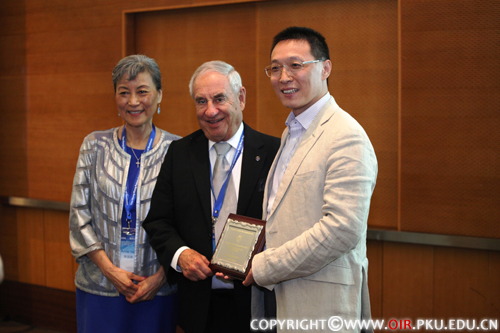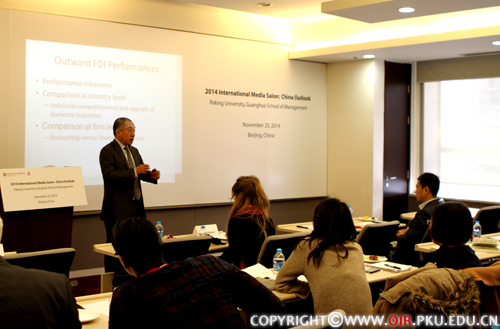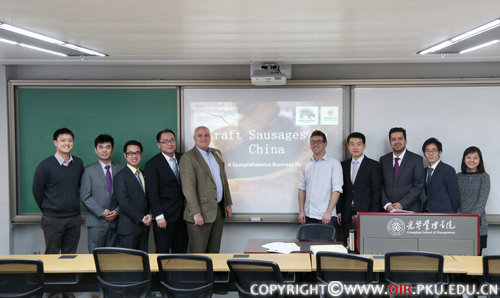Peking University, Guanghua School of Management is committed to advancing management knowledge and developing business leaders for China and the Global Society - a mission which was fulfilled in 2014 through dozens of speaker events, journals of research and many hours of dedicated class-work. Moreover, throughout 2014, many events in global business and China's economics occurred and fueled our professor's passion for high level research.
Looking forward to 2015 and our 30th Anniversary Year, Guanghua is inspired to continue its close analysis of Chinese business and now presents the management insights of three professors to guide your own 2015 China Watch: Professor Zhang Zhixue on the new generation of Chinese executives; Professor Wu Changqi on an unprecedented level of outward investment; and last by not least, Professor Paul Gillis and Alibaba's record-breaking IPO.
1. A New Economy and the New Manager: A Constant Survival of the Fittest
With specialties in leadership behavior in Chinese firms, negotiation, teamwork and cross-cultural management, Guanghua School of Management Assistant Dean and Professor of Organizational Management ZHANG Zhixue has been witnessing theories come alive as the China's outward investment and number of firms going global has increased.
In particular, ZHANG noticed how Chinese leadership has transformed to meet the demands of the changing Chinese economy. This topic, the evolution of Chinese managers and the three types of Chinese managers, was the main focus of his research published in the world-class academic journal, "Management and Organization Review" entitled "Business Leadership in the Chinese Context: Trends, Findings and Implications"
In his article, Zhang and his research team explain that the successful executives are those who remain congruent with the environment by developing an entrepreneurial mindset. Since the 1980s, China has seen three types of managers emerge:
- 1980-1990s: Political Wisdom Leader
During the1980s, the economy transitioned from the tight government control to marketization. Business leaders emerging from this era needed political know-how and business savvy in order to succeed.
- 1990s: The Business Professional Leader
In the 1990s, China began to relax government regulations and embrace the market. Business leaders emerging from this era did not have to rely heavily on ‘guanxi’ (personal and professional connections) to succeed. Thus, professionalism and business knowledge became the key to success.
- WTO member to present: International Operator
The modern, globalized Chinese business environment presents new challenges.To compete in the international markets, managers must be aware of and engaged in foreign cultural, economic and political environments.
According to Zhang, the next stage of evolution will demand heightened sensitivity to cultural differences with foreign partners and the cultural changes of younger Chinese employees - specifically the skewed power-distance dynamic that makes authoritarian leadership style ineffective.

[IMAGE: Professor ZHANG Zhixue (R) with the award for "Management and Organization Review" which earned a world-class impact rating in 2014]
2. A New Era: When Outward Investment Eclipses Foreign Direct Investment
A Professor of Strategic Management who is an active consultant for both businesses and the Government, WU Changqi understands what "going global" really means for Chinese firms and how the practice will continue over the next year. This ability explain the trend is very important for 2015 as it is the first year during which Outward Investment is expected to overtake Foreign Direct Investment in China for the first time.
In his December 19 opinion-editorial piece for the China Daily European Edition, and echoed in his presentation for International Media at Guanghua's International Media Salon, WU explained that the new level of outward investment reflects a new maturity of the Chinese firms to expand and also an evolution of the overall Chinese economy.
"In the early times, green-field entry was dominant, but now only this is only 1/3 of the entry. The majority of foreign market entries of over 2/3 are in the form of mergers and acquisitions. The reason for this change is that overtime, Chinese companies have built up skills to manage acquisitions," said WU at the International Media Salon.
WU is careful to point out, however, that not all Chinese firms are poised for an international venture.In fact, the decision to go abroad is specifically suited to the central State Owned Enterprises but not the provincial level.
"Of the two categories of Chinese State Owned Enterprises (SOE), the central SOE and the provincial level SOE, the central SOEs have stronger incentive to go abroad. In contrast, the provincial level SOEs are focused primarily on the region's economic growth and attracting capital, and therefore are less motivated to expand overseas markets," said WU.
As for where we can expect to see the Chinese companies overseas, WU points to USA, Singapore, Australia, Germany and Japan as these countries were the top choice of locations of overseas subsidiaries in the past.

[IMAGE: Professor WU Changqi giving his presentation the 2014 International Media Salon]
3. So much more than China's EBAY: The VIE Structure and Alibaba's Giant IPO
One of the biggest pieces of news about China and business in 2014 was the Initial Public Offering made by Alibaba in the New York Stock Exchange on September 19, 2014. Highly anticipated, the listing event did not disappoint as it set records for the world's biggest IPO with an initial figure of USD 21.8 billion. The deal created a great deal of buzz and confusion as the logistics for a Chinese firm to list overseas are all but simple.
Paul Gillis, an accounting professor and Director of the MBA Program at Guanghua School of Management, was a heavily quoted expert on the topic of Alibaba's IPO and the variable interest entity (VIE) constructed to do the listing.
The VIE structure, Gillis explained, is a major development in Chinese accounting over the past year because it allows the consolidation of financial statements of companies which are not owned, but rather controlled through other contractual means.
"The VIE structure allows foreigners to have an interest in foreign companies from which they are otherwise banned. The VIE concerns many investors because contracts are a poor substitute for ownership. This was highlighted when Jack Ma took Alipay out of Alibaba much to the surprise of Yahoo! investors," said Gillis at the International Media Salon.
However, again in early December 2014, the Alibaba offering began to draw attention yet again as media and business critics pointed to accounting errors made by the company regarding reporting of their Film Unit. On this issue, Gillis told Bloomberg News in Hong Kong, that the mistakes reflected "sloppy" accounting practices but also the company's "learning" process.
The future for Chinese companies getting listed abroad is a bright one especially as the Public Company Accounting Oversight Board (PCAOB) and Chinese accounting regulators work together.Gillis thinks the cooperation between the two groups is a long time coming and isn't without its difficulties:
"It has always been China's position that foreign regulators are not allowed to enforce foreign laws on Chinese people on Chinese soil because that would violate Chinese sovereignty," said Gillis.
However, he is nevertheless hoping for a diplomatic breakthrough of government-to-government negotiations to help smooth the road for future cooperation.

[IMAGE: Professor PAUL GILLIS with the 2015 MBA Cohort at their Final Business Plan Presentation for the 'Doing Business in China' Class]



